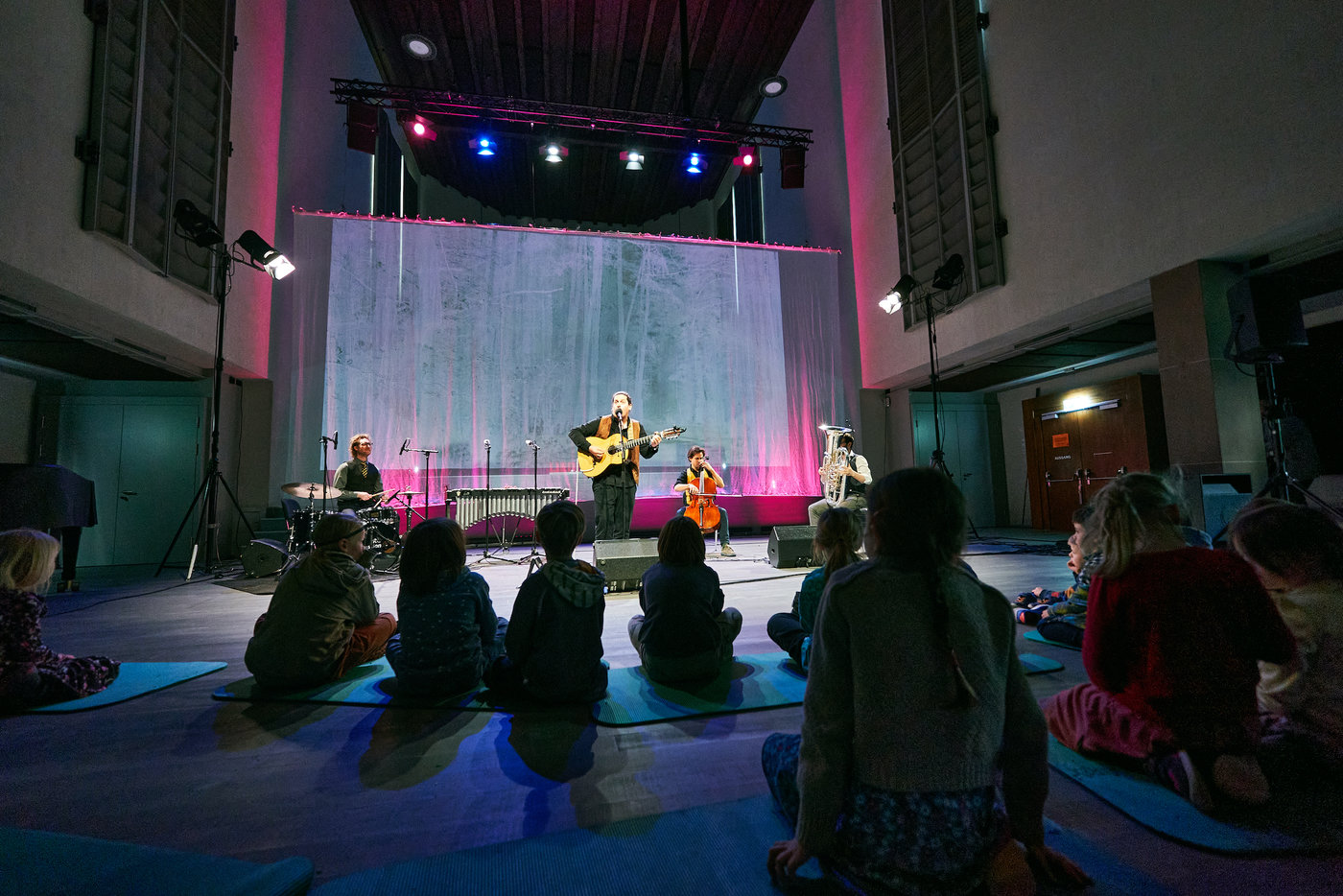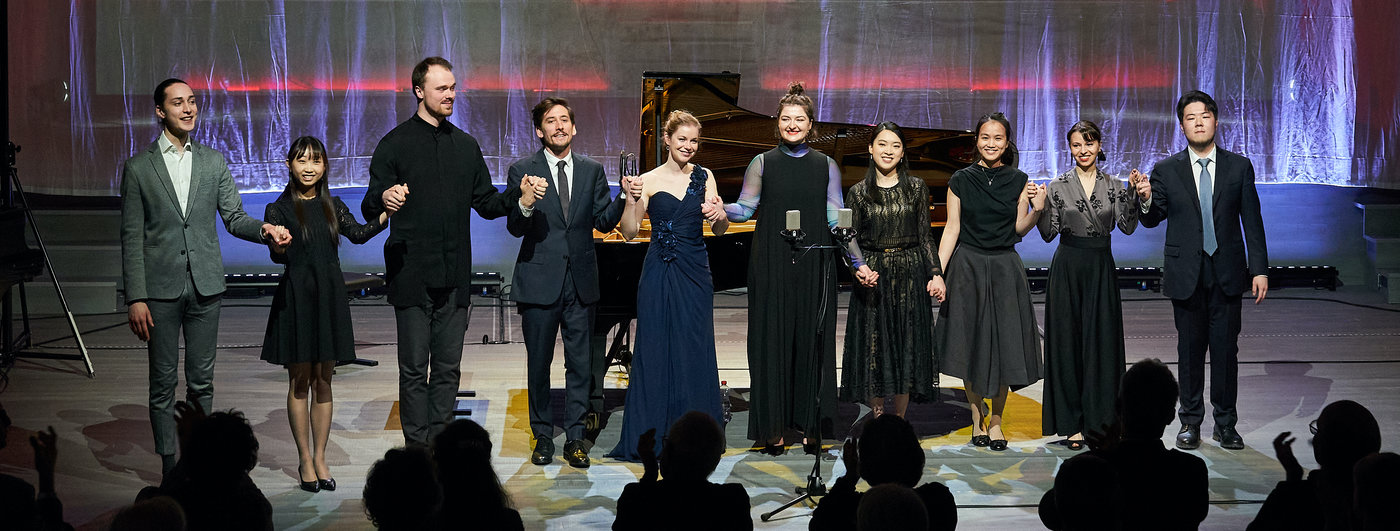What songs do to us
The fourth Lied Basel Festival offered concerts, master classes - and news from a North Pole expedition - under the motto "living dangerously".

In 2016, mezzo-soprano Silke Gäng and her husband, music and theater scholar Ludovic Allenspach, gathered ideas for what they saw as an ideal and contemporary song festival. With Meike Olbrich (managing director and amateur singer), Alain Claude Sulzer (writer) and Tobias Schabenberger (pianist), they brought friends on board and founded the Basel Lied Foundation. Each member covered one aspect of the song, so to speak. Thanks to a number of patrons, various foundations and cantonal support funds, the project was put on a solid footing.
After 2019, 2021 and 2022 (2020 was canceled for known reasons), the Song Basel took place for the fourth time on April 19-23. For the second time, the spacious premises of the Don Bosco Music and Cultural Center were used. At the heart of the festival are master classes called the Lied Academy. 65 duos from all over Europe applied for this year's scholarships in a multi-stage process. In the end, 5 were awarded the scholarships. These are young musicians at the beginning of their professional careers. Each duo received four hours of highly competent tuition from the so-called "Duo in Residence", consisting of the internationally successful mezzo-soprano Angelika Kirchschlager and the renowned pianist and accompanist Malcolm Martineau. On one day, the scholarship holders attended an acting workshop with Klaus Brömmelmeier. They also received advice on career issues from Aimée Paret, who has been working as an artist consultant for some time.
The varied musical festival program consisted of a total of eight concerts. These included the world premiere of the Lied Basel commissioned composition by Stephanie Haensler and a family concert. The festival kicked off with a musical discussion concert, and the final concert by the scholarship holders took place on Sunday.

Dangerous water, dangerous ice, dangerous singing
The motto "living dangerously" was explored from various angles in a colorful supporting program. Eva Gesine Baur presented her brand new biography of Maria Callas, The voice of passion, before. The singing legend of the 20th century lived dangerously, taking full risks in every phase of her life. The "dangerous professions" of apnoea diving and singing were juxtaposed in the Lied Lab.
When asked at the opening event what "living dangerously" means to her and whether she is courageous, Angelika Kirchschlager replied: "Everyone who goes on stage lives dangerously". With a wink, she continued: "And for me, courage means singing yourself after you have explained to the students how to do it." The duo in residence performed a recital on Thursday evening. With creative intensity, Kirchschlager performed songs with a focus on German Romanticism through to Mahler, Strauss and Poulenc. Malcolm Martineau accompanied with precision and great nuance.
On Saturday evening, baritone Benjamin Appl and pianist James Baillieu performed Schubert's Winter journey on. According to Appl's biography, he benefited greatly from lessons with Dietrich Fischer-Dieskau, whose last pupil he was. He has a warm and powerful voice and is not afraid of dynamic extremes and unusual agogic turns. He also proved his stamina, as the concert lasted over two hours. Between the songs, actor Harald Krassnitzer read from diaries and logbooks from the failed Austro-Hungarian North Pole expedition of 1872-1874. At first glance, the stories of the shipwrecked men, who lived in mortal fear for two years, did not have much in common with Schubert's song cycle, which had been published around half a century earlier, but then moving points of contact emerged time and again.
It takes a bit of courage to present Schubert songs in a pop and jazzy form at a classical music festival. The band The Erlkings did just that and met with unanimous enthusiasm from the Basel audience.
As part of the program launched last year Lied Basel donation project "Song Recitals in Times of War" four musicians from Ukraine were brought to Basel for a concert at short notice. The connection with the topic of mortal danger is obvious. (Report in the Swiss Music Newspaper about recitals in the Ukraine)
"Don't show me, but let me know"
There are many examples of master classes with renowned artists that encourage voyeurism on the part of the audience. The fact that this was not the case with Kirchschlager and Martineau is to their credit. The tone was collegial and the advice was practical and concrete. When someone arrives with a well-rehearsed song and is given various instructions on what to change vocally and interpretatively in a short space of time, it can be overwhelming. However, the scholarship holders usually reacted very calmly and professionally and were able to implement many things directly. "The song has to do something with us, not us with the song," is how Kirchschlager formulated one of her principles.

When it comes to interpretation, some people overshoot the mark and emphasize individual words onomatopoeically, for example. However, it is important to interpret the message and not individual words and this can only be done by understanding the text: "Without text, no expression," she repeated emphatically several times. Malcolm Martineau emphasized an exciting aspect: "The formation of the initial consonant always tells you what meaning you want to give the respective word." A seductive "sing along" should be avoided: "You have to resist the harmonies with the text," said Kirchschlager. The attitude of the singer is crucial. Personal consternation and self-pity should not be seen in the performer: "Don't show me, but let me know", the lecturer summed it up. You shouldn't be guided too much by moods and shouldn't take too many liberties: "Interpretation doesn't mean singing every day the way you feel."
The participants are likely to have returned home from this week with a full rucksack of experiences and have added several pieces of the puzzle to their artistic development.








